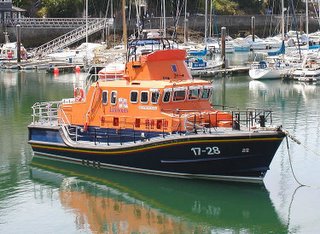TTAB Alert: "MAYDAY" Merely Descriptive of Emergency Transceivers
The Board ignored the AAA's call for assistance and instead affirmed a Section 2(e)(1) mere descriptiveness refusal of the mark MAYDAY for "electronic transceivers for vehicles for requesting emergency police, fire, and rescue service, emergency road service, and for requesting and receiving travel information." In re American Automobile Association, Inc., Serial No. 75719651 (December 7, 2005) [not citable].

Examining Attorney J. Brett Golden applied the brakes to the AAA's drive to registration, maintaining that the mark "is merely descriptive, and not suggestive, of a use or function of the identified goods." He relied on a dictionary definition of "mayday" as "an international radiotelephone signal word used by aircraft and ships in distress," and he contended that "mayday" is "commonly used to describe a distress signal or request for emergency assistance from the user of a motor vehicle." Moreover, he urged that "mayday" has become a "term of art" to describe a system for enabling a motor vehicle operator to request emergency assistance and to communicate with rescue personnel.
AAA asserted that MAYDAY is at most suggestive of its goods because "mayday" has many meanings, as evidence by various Google and Yahoo search engine results.
The Board found that the PTO's Internet evidence established a prima facie case that MAYDAY merely describes a use or function of the goods:
"it is apparent that 'mayday' is a term used to identify or describe a system for alerting emergency police, fire and rescue professionals of a motor vehicle in distress, and that a communication device which sends a distress signal to such professionals, such as an electronic transceiver, is used in such a system. Thus, one use or function of the goods identified in the application is with mayday systems."
AAA argued that the issue of descriptiveness must be evaluated "from the standpoint of the prospective purchaser of the goods," and that the Internet evidence merely shows the "jargon" used by federal and state departments of transportation. The Board found that argument "not well taken," noting that there is no reason why automobile manufacturers who are potential customers for applicant's goods would not review these articles in considering whether to include transceivers in their vehicles. The same is true of individuals who are contemplating installing a transceiver in a vehicle in order to participate in a "mayday system."
Moreover, the Board concluded that "mayday" is a term that is not limited to "aircraft or ships." AAA conceded that "MAYDAY! MAYDAY! is an international radiotelephone signal word used as a distress call." Therefore, "mayday" is a term "that one may use with an electronic transceiver in seeking 'emergency road service,'" and as such it "describes a feature of applicant's goods."

Finally, the Board dismissed AAA's contention that, because of the multiple meanings of "mayday," a consumer "must employ some imagination, thought, or perception to reach a conclusion as to the nature of Applicant's goods." As the Examining Attorney pointed out, descriptiveness is considered in the context of the applied-for goods, not in the abstract. "[T]he fact that a term may have different meanings in other contexts is not controlling on the question of descriptiveness."
Therefore, because AAA's goods may be used in connection with "mayday systems," the Board affirmed the refusal to register.
Text Copyright John L. Welch 2005.




0 Comments:
Post a Comment
<< Home